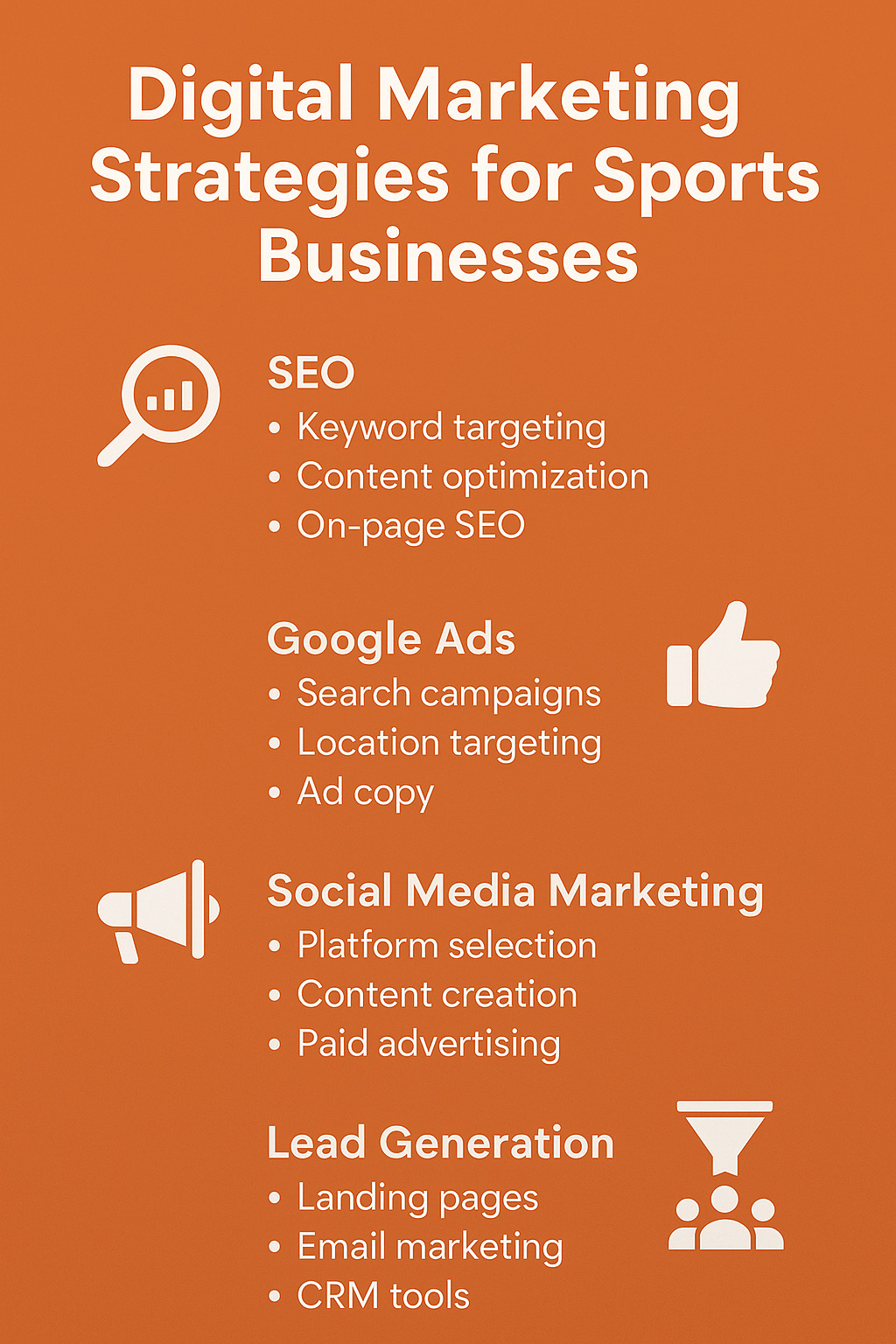How Digital Marketing Works for the Sports Industry

The sports industry has always been about connecting fans with the action, building devotion to teams, and creating excitement around events. However, the way these connections are made has evolved significantly due to digital marketing. Today, digital marketing plays a vital role in how sports organizations engage their audiences, attract sponsors, and grow their brands. This blog will unpack the strategies and techniques fueling digital marketing in sports, from audience engagement to analytics, highlighting examples of success along the way.
The Role of Digital Marketing in Sports
Digital marketing provides sports organizations with tools to reach fans directly, cultivate loyalty, and drive revenue. Through websites, social media platforms, streaming services, and email campaigns, brands can create personalized and immersive experiences. Furthermore, the instant communication provided by digital platforms ensures organizations stay close to their audience, building stronger and longer-lasting relationships.
Key Areas Where Digital Marketing Impacts the Sports Industry
To understand the full scope of digital marketing’s impact, let's explore five fundamental areas where this strategy transforms the sports landscape.
1. Audience Engagement
One of the primary objectives of sports marketing is to engage with fans on a deeper level. Digital platforms provide unparalleled avenues to create interactive, exciting, and emotional experiences for fans. Here’s how organizations accomplish this:
Social Media Interaction: Platforms like Instagram, TikTok, and Twitter allow fans to connect directly with their favorite athletes and teams. Whether it's behind-the-scenes videos, poll features, or Q&A sessions, these platforms make fans feel part of the action.
Live Streaming and Real-Time Content: Streaming games or practice sessions through platforms such as YouTube or Twitch drives real-time engagement and expands viewership beyond traditional stadiums. For example, FC Barcelona’s official YouTube channel brings insider content to fans worldwide.
Gamification: By incorporating trivia quizzes, rewards for predictions, or fantasy sports games into apps, teams and organizations foster ongoing fan participation.
Interactive campaigns not only strengthen fan loyalty but also amplify the reach of the team or brand through shares and user-generated content.
2. Sponsorship Activation
Sponsorships have long been critical to sports, and digital marketing maximizes their potential. By integrating sponsors naturally into online content, sports entities can provide measurable value to collaborators, such as:
Branded Content: Rather than relying on static banner ads, many sports marketers now use engaging branded content. For example, Nike capitalizes on its partnerships with elite athletes by creating viral "Just Do It" campaigns.
Social Media Collaborations: Sponsors often team up with sports organizations for co-branded posts. Manchester United and Adidas frequently collaborate on Instagram posts promoting club jerseys using trending hashtags.
Interactive Features: Sponsors are also embedded into unique experiences, such as AR filters on Instagram or branded challenges on TikTok, which reach users in creative ways.
Digital sponsorship campaigns offer transparent data through clicks, reach, and engagement metrics, making them more appealing and impactful for brands.
3. Social Media Strategies
Social media is the heart of sports marketing in the digital age. Whether it’s celebrating a victory, announcing a signing, or hyping up an upcoming rivalry game, digital platforms amplify these moments globally.
Key elements of successful social media strategies include:
Timely Updates: Posting immediate match results or play highlights keeps fans engaged during and after events.
Humor and Virality: Engaging content, such as the witty memes the NFL shares after games, fosters broader interaction and appeal outside hardcore fan circles.
Exclusive Access: Sharing “behind-the-scenes” glimpses—like locker room footage or travel diaries—humanizes players and builds deeper fan bonds. For instance, NBA teams often post warm-up routines and off-court interactions that fans eagerly follow.
Social media not only grows fan engagement but also adds significant revenue streams through advertisements, cross-promotion, and partnerships.
4. Content Marketing
High-quality, value-added content drives deeper connections by providing fans stories, analysis, and insights they cherish. Through blogs, podcasts, and video content, organizations build a stronger narrative around their athletes and events.
Examples include:
Narrative Storytelling: Mini-documentaries, like Amazon’s "All or Nothing" series focusing on Premier League clubs, add context to the action on the field by highlighting behind-the-scenes stories.
Educational Content: Training tips, game strategies, or fitness insights resonate with younger fans or aspiring players while also building trust.
Fan-Generated Content: Encouraging fans to share how they support their teams, through hashtags or contests, enriches the fan experience while offering organic marketing opportunities.
This focused investment in storytelling not only generates clicks but also strengthens emotional ties with fans.
5. Data Analytics and Personalization
No modern digital marketing effort is successful without analytics. Today’s sports marketers rely on comprehensive data to measure results and optimize campaigns. Here are some practical examples:
Performance Tracking: By analyzing social media impressions, engagement rates, and website traffic, teams can determine what works and adjust efforts accordingly.
Personalized Experiences: Learning about fan preferences allows marketers to create messages tailored to specific demographics. For instance, the use of email marketing with personalized player stats or merchandise suggestions has been hugely successful.
CRM Platforms: Fans are segmented based on activity or geography to receive hyper-relevant promotional offers, notifications, or content recommendations.
The NBA's League Pass is a great example. By monitoring viewer behavior, they suggest games tailored to individual preferences, driving subscriptions and satisfaction.
Successful Digital Marketing Campaigns in Sports
1. Nike’s Dream Crazy Campaign
This viral ad featuring Colin Kaepernick built a powerful, emotional narrative while creating conversations around social justice and sports. The campaign demonstrated that taking bold, purposeful stands can resonate with global audiences.
2. Real Madrid’s All-Digital Strategy
Real Madrid is a pioneer in building an all-digital platform with over 250 million global fans across social media. They create dedicated content for regional audiences in multiple languages, establishing themselves as a true global brand.
3. Under Armour’s Will Finds a Way Campaign
This campaign featured athletes like Dwayne Johnson and emphasized grit and perseverance. The digital-first approach included motivational videos and interactive challenges, sparking major fan engagement.
The Importance of Digital Platforms in the Sports Ecosystem
Digital marketing platforms offer more than just increased reach—they enable real-time interactions, measurable data for fine-tuning campaigns, and significant cost advantages over traditional media. They foster communities, support monetization through sponsorships, and consistently expand the global fandom for sports teams and events.
Whether you’re promoting the next big championship or engaging a niche community within a sport, digital strategies provide the flexibility to connect authentically with fans. With a combination of creativity, compelling storytelling, and informed analytics, digital marketing continues to reshape the sports world dramatically.
Final Thoughts
Digital marketing is not just a tool for the sports industry anymore—it’s the backbone of how organizations function in the modern era. By leveraging the power of social media, personalized content, strategic sponsorships, and robust analytics, sports organizations build lasting relationships with fans, attract investment, and achieve their marketing goals.
For sports marketers, the challenge isn’t whether to adopt digital marketing—it’s about continuously innovating to stay ahead of the game. Start building your digital playbook today, and watch your audience, influence, and revenues soar.
Note: IndiBlogHub features both user-submitted and editorial content. We do not verify third-party contributions. Read our Disclaimer and Privacy Policyfor details.


